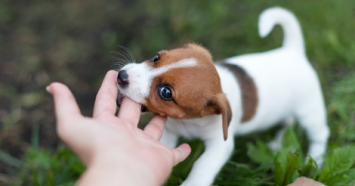
When puppies play with other puppies or explore their environment, they do so with their mouths. It is common for puppies to bite or "mouth" hands and clothes during play or when looking for attention. As annoying and sometimes painful as this behavior may be, it is normal and an important developmental behavior.
When a dog bites another dog or a human, the amount of damage that is inflicted is determined by the amount of pressure the dog exudes with his mouth. As a puppy owner, you want to teach your puppy to inhibit his bite, so when he put his teeth on humans he exudes very soft or no pressure. Most of the work of bite inhibition should have been taught in the litter, however, you may have some training do do as well. The first place to begin is by teaching your puppy how to take treats appropriately.
Getting Your Puppy to Take Treats Gently
Begin by offering your dog a treat in a closed fist. If he attempts to take the treat and you can feel pressure from his teeth or if he puts your whole hand in his mouth, remove your hand – not allowing him to have the treat. Wait 5 seconds and try again. When your dog stops biting and mouthing and offers a lick or stops adding pressure so that you can barely feel his teeth, reward his behavior and offer him the treat. Repeat these steps several times per day. These steps should be taken anytime your puppy is given food from your hand.
Treats are only given when the dog takes them nicely. If you have a family member such as a young child who can not gauge how much pressure is too much, always have them offer food from an open palm. The more times your dog gets to take treats inappropriately the longer it will take for your dog to learn and take treats gently.
Discourage Unacceptable Behavior
You must also teach your puppy to be gentle with hands, and that nipping results in unpleasant consequences for her. Teach your puppy that nipping "turns off" any attention and social interaction with you. When your puppy nips you, say “OUCH” loudly, as though you’ve been mortally wounded, then get up and leave the room for 30 seconds. It may take many repetitions for him to understand what’s expected. Do not return to playing if the puppy has not settled down.
If your puppy is grabbing and nipping clothes, stop! Don’t look at him or talk to him, just completely freeze. Wait for him to let go of your pants, and then continue on your way. If you continue to walk, your puppy gets to play tug with your pant leg - a very fun game! If you are wearing something that you can‘t wait for your puppy to learn that the pants won’t play back or if children are involved, interrupt the behavior with a verbal reprimand like “Hey” and have your puppy sit. After he sits, count to three and offer him an alternative reward such as a favorite toy.

Encourage Acceptable Behavior
Redirect your puppy’s chewing onto acceptable objects by offering her a small rawhide chew bone or other type of chew toy whenever you pet her. This technique can be especially effective when children want to pet her. As you or the child reach out to scratch her behind the ears (not over the head) with one hand, offer the chew bone with the other. This will not only help your puppy learn that people and petting are wonderful, but will also keep her mouth busy while she’s being petted. Alternate which hand does the petting and which one has the chew bone. At first, you may need to pet or scratch your puppy for short periods of time, since the longer she’s petted, the more likely she is to get excited and start to nip.
What Not To Do
Attempts to tap, slap or hit your puppy in the face for nipping are almost guaranteed to backfire. Several things may happen, depending on your puppy's temperament and the severity of the correction:
He could become "hand-shy" and cringe or cower whenever a hand comes toward his face.
He could become afraid of you and refuse to come to you or approach you at all.
He could respond in a defensive manner and attempt to bite you to defend himself.
He could interpret a mild slap as an invitation to play, causing him to become more excited and even more likely to nip.
Limit "tug-of-war" or wrestling games with your puppy if you’re having a nipping problem. These types of games encourage out-of-control behavior, grabbing, lunging and competition with you. These aren’t behaviors you want him to learn.
Training Tip!
If you puppy is ripping clothes clothes or leaving wounds on your hands, consider seeking professional help such as the Certification Council for Professional Trainers.